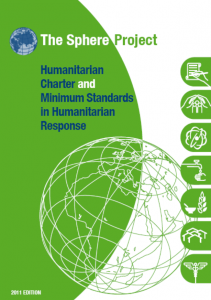The UNHCR WASH Manual Part 1: Programme Guidance, provides practical guidance for WASH programmes in refugee settings.
- Categories: WASH Manual.

The UNHCR WASH Manual Part 1: Programme Guidance, provides practical guidance for WASH programmes in refugee settings.

This report is based on a desk-based review of secondary data, comprising published material as well as grey literature, supplemented with key informant interviews for programmes that lacked documentation. Section One summarises the current use of CBI in WASH programming. Section Two summarises the best practices and lessons learned including challenges faced, drawing on evidence from the project examples found. Section Three provides recommendations and best practice guidance for use of CBI in refugee settings. Section Four details existing tools and guidance.

These guidelines explain what is camp management; the roles and responsibilities of different stakeholders; the importance of community participation and involvement; the importance of good coordination and coordination mechanisms; the importance of information management and data analysis; guidelines for registration and profiling; guidelines related to shelter, NFI distributions, health, water and sanitation, domestic energy, education, agriculture, livelihoods, protection and gender based violence activities; and guidelines for camp setup and closure.

This document provides guidance on how to access the WASH Report Card within TWINE, and fill in the different fields with the right information, with examples for easy comprehension.

This toilet block management sample community agreement can help define the responsibilities of the different stakeholders in operation and maintenance of WASH facilities from filling up the hand-washing water containers, and keeping the surroundings clean, to providing maintenance.

A sample organigram for running a typical refugee WASH programme for 20,000 people in a post emergency camp based setting. The organigram gives an indication of how the WASH Team should be structured in addition to the tentative number of Coordinators, Team Leaders, Officer, and Assistant level staff that should be recruited.

This is the standard UNHCR well cleaning and chlorination template for refugee settings available in PDF and MSExcel formats. The form should be completed each time a hand dug well is cleaned, chlorinated and tested for faecal coliforms. The form is available in MSExcel format so WASH actors can adapt the content to the context.

This template can be used to help UNHCR and WASH actors establish a simple WASH operational plan (WHO will do WHAT, WHERE, WHEN, and HOW and WHO will PAY and WHO will MONITOR). This template can be used in addition to the site level WASH Strategy Template.

The Sphere Handbook is one of the most widely known and internationally recognized sets of common principles and universal minimum standards for the delivery of quality humanitarian response.

These guidelines have been designed to help those involved in the assessment of emergency water sources to collect relevant information in a systematic way, to use this information to select a source or sources and to determine the appropriate level of treatment required to make the water suitable for drinking.